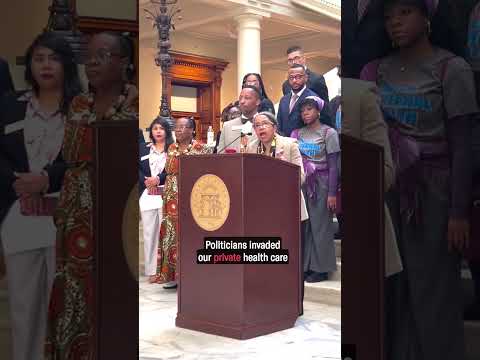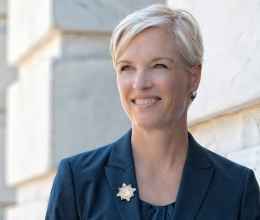
Naomi Desta-Bell, who works as a doula, says the healthcare gap experienced by Black people who are pregnant has widened since Georgia’s six-week abortion ban took effect in July 2022.
People have been scared, outcast, and denied medical care from health institutions.
“If you look at the preventable deaths of Amber Nicole Thurman and Candi Miller, you’ll see that folks who have long experienced marginalization and oppression are now experiencing those same systemic issues in healthcare in higher degrees when compared to others,” said Desta-Bell, Feminist Women's Health Center’s community outreach manager.
The ACLU of Georgia joined Desta-Bell and a coalition of advocates at the Capitol for Black Maternal Health Advocacy Day on Tuesday, Feb. 18, organized by SisterSong Women of Color Reproductive Justice Collective. Our Executive Director Andrea Young and many others including some lawmakers spoke about the long-standing needs of Black pregnant women and people during the event.
The reality is alarming:
- The maternal mortality rate for non-Hispanic Black women rose from 49.5 to 50.3 deaths per 100,000 live births, according to 2023 data from Centers for Disease Control and Prevention.
- The rate for Black women dying from pregnancy-related causes from 2022 to 2023 is the only rate for a tracked group of people that didn't appear to decline, the CDC says.
- Georgia received a failing grade in a recent March of Dimes report on the state of maternal and infant health.
- Nationally, Black women are three times as likely to die from pregnancy-related causes than white women.
“Since the time of slavery, Black Women in Georgia have been fighting to assert control over their own bodies — to protect themselves from forced sterilization and forced pregnancy,” said Young. “When the governor pushed for and the legislature passed a six-week abortion ban, there was already a maternal health crisis for all women in Georgia, and double the threat for Black women. Politicians invaded healthcare decisions and maternal mortality increased.
“I am a mother and grandmother; I believe Georgia's women and couples have the right to make private healthcare decisions with their own faith, their own families, and their own physicians. The ACLU of Georgia will keep fighting until that right is restored,” she said.
The day of advocacy was capped by the presentation of the Advancing Black Maternal Health Resolution to both chambers. Organizations like SisterSong are asking for enhanced reproductive rights, the creation of a Black Maternal Health Caucus, and more. We support their efforts.
We’ll continue to pursue all legal means to give Georgians the right to make their own health care decisions free from political interference. Advocates like Desta-Bell are continuing their tireless work in the community.
“We stood together today to speak up for those folks whose deaths were preventable and to prevent any future deaths."




